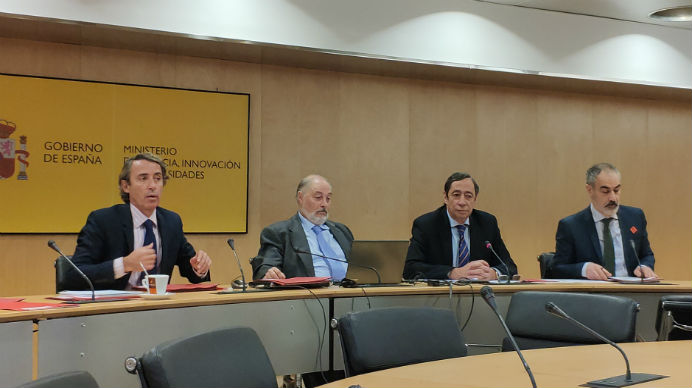
The Spanish Ministry of Science, Innovation, and Universities has hosted a meeting on the European macro project Human Brain Project (HBP), an initiative supported by the European Commission focused on understanding how the brain works in three areas: medicine, neuroscience, and computing. The Practicum Foundation was there to learn the results of the meeting, with interest in the new national industrial hub. The HBP, which started in 2013, has the participation of nearly 900 scientists from more than 120 research institutions from all over the continent and funding of more than 1 billion euros.
Madrid, December 14, 2018. One of the medium-term European priorities in research, development, and innovation (R+D+i), shared by the Practicum Foundation, includes advancement in knowledge of the human brain. Due to that, the foundation attended the Spanish Industrial Hub event of the Human Brain Project (HBP) invited by the General Secretariat of Coordination of Scientific Policy, under the Ministry of Science. The HBP comprises six research platforms, including a Brain Simulation Platform and a Neuromorphic Computing Platform, currently involving ten Spanish institutions led by the Polytechnic University of Madrid.
Planned for 10 years, after the first phase of the project, which ended at the end of 2017, a second phase started with the objective of encouraging the participation of the industrial sector in the project with a dual purpose: first, to facilitate maturation of some technologies developed with a potential of market exploitation, and second, to evaluate the interest of the business sector in the study of the brain. According to Rafael Rodrigo, the general secretary of Coordination of Scientific Policy, "This is one of the great global challenges that we must address jointly, both the administration and the public research centers, including universities, as well as the private initiative."
The simulations will serve as a basis for new diagnostic and treatment tools in brain pathologies, cutting-edge prosthetic technology for individuals with disabilities, low-energy information technologies with intelligence similar to that of the brain, and a pioneering generation of intelligent robots. The goal of the HBP is to build detailed biological simulations of the human brain – a kind of a brain atlas – analogous to cartography. Brain models will shed light on the causes of brain diseases, their early diagnosis, and the development of new cures. Understanding and reproducing the way the brain works is a challenge for information technology, medicine, and society.
Self-learning equipment
"The human brain is made up of 86 billion nerve cells, so understanding its organization requires different scales: neuronal synapses are not the same as cortical areas or as brain function," explained Gonzalo León, the Vice-Rector of Research at the Polytechnic University of Madrid (UPM). The brain can be seen as a personal endowment of self-learning, self-repair, and energy efficiency. To understand how it works, information about the inner workings of brain molecules, cells, and circuits will be collected, and knowledge will be gathered in massive databases to create simulations.
Guillermo Velasco, from the innovation and technology transfer node at UPM and Alfonso Beltrán, deputy director of international research programs of the Carlos III Health Institute of Madrid agree that this is a great umbrella of investment and knowledge creation, what lies ahead is to articulate it. The plan of the Spanish industrial hub is scheduled to start in January 2019. As for the Practicum Foundation, the focus is set on machine learning and neuromorphic chips. "We want to continue exploring the heuristic phenomena and automatisms within the unconscious phenomena that occur in decision making," said the president of the foundation, Dr. Eduardo Hornos.
Our personalized help center enables you to obtain technical support and help for navigating through the site and using the program.